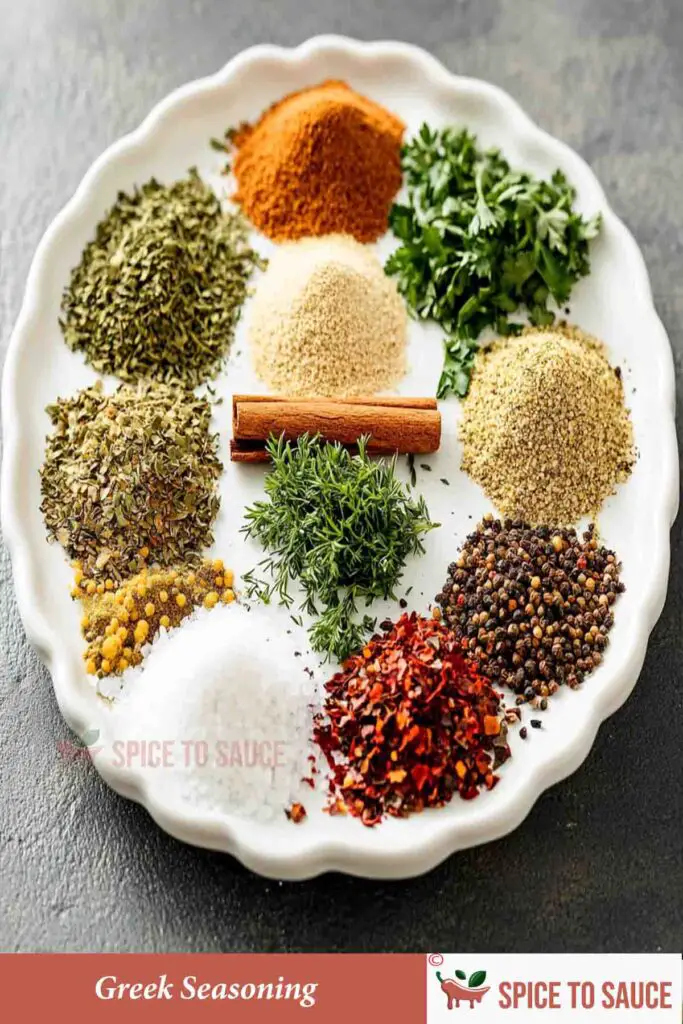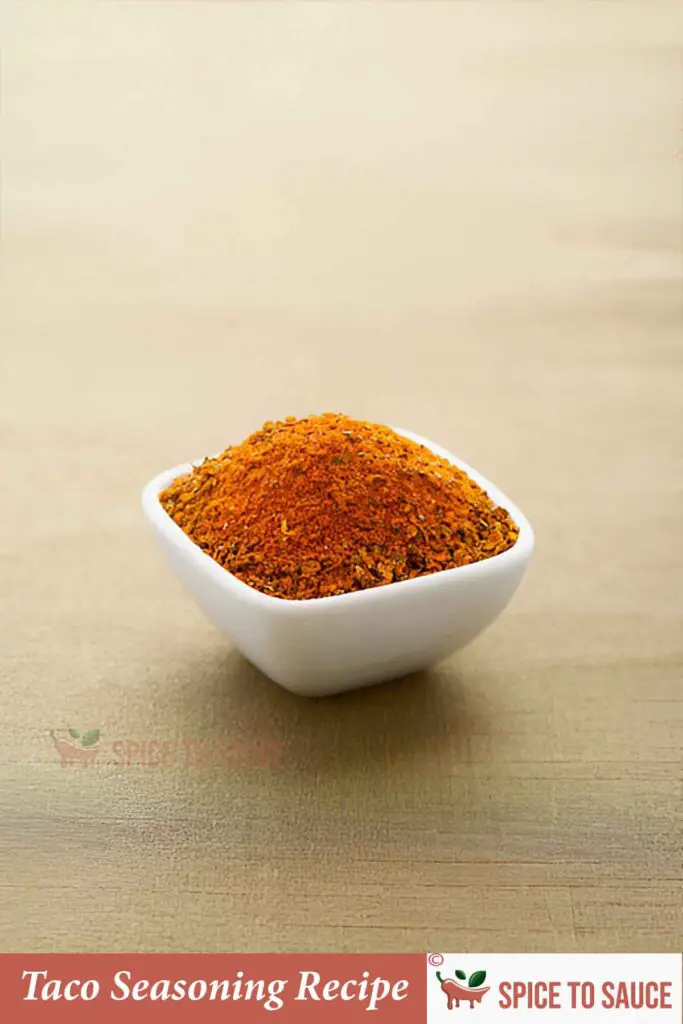Are you tired of bland meals and looking to add some Mediterranean flair to your dishes? Look no further than this Homemade Greek Seasoning Recipe! This versatile blend of herbs and spices will transport your taste buds straight to the sunny shores of Greece with just a sprinkle.
Today, we’ll walk you through the simple steps to create your own batch of authentic Greek seasoning right in your kitchen. Say goodbye to store-bought seasonings filled with preservatives and additives, and say hello to a fresh, flavorful alternative that will elevate your cooking to new heights.

What Is Greek Seasoning?
Greek seasoning is a blend of herbs and spices commonly used in Mediterranean cuisine. It typically includes ingredients like oregano, thyme, basil, garlic powder, onion powder, dill, and sometimes mint.
These flavors are meant to evoke the traditional tastes of Greek dishes such as souvlaki, Greek salads, and lamb gyros. The mix is aromatic, savory, and slightly earthy, offering a balance of herbal freshness and savory depth. Some variations may also contain lemon zest, marjoram, or parsley, enhancing the brightness of the blend.
It’s versatile and can be used on meats, vegetables, salads, or in marinades to bring out the signature flavors of Greek cooking. You can either purchase pre-made Greek seasoning or make your own at home by combining the herbs in your preferred ratios.
Essential Ingredients In Greek Seasoning
Greek seasoning is a versatile blend of herbs and spices that captures the flavors of the Mediterranean. While recipes can vary slightly, the following ingredients are commonly found in Greek seasoning blends:
Dried Oregano 2 Tablespoons
Dried oregano is the cornerstone of Greek seasoning, offering a robust, earthy flavor with subtle hints of bitterness. It adds a warm, aromatic note to dishes like grilled meats, salads, and stews in Mediterranean cuisine.
Dried Parsley 2 Tablespoons
Dried parsley adds a mild, fresh, and slightly peppery flavor to Greek seasoning. It enhances dishes with a subtle green, herbaceous note, often complementing the bolder flavors of oregano, garlic, and lemon in Greek cuisine.
Sea Salt 2 Tablespoons
Sea salt is a key ingredient in Greek seasoning, providing a natural, mineral-rich saltiness. It enhances the flavors of herbs and spices, helping to balance and elevate the overall taste of Mediterranean dishes.
Garlic Powder 1 Tablespoon
Garlic powder adds a savory, slightly sweet garlic flavor without the intensity of fresh garlic. It complements the other herbs in Greek seasoning, bringing depth and richness to dishes like meats, salads, and sauces.
Onion Powder 1 Tablespoon
Onion powder provides a mild, sweet, and slightly tangy onion flavor. It enhances the savory profile of Greek seasoning, adding depth to dishes like grilled meats, vegetables, and sauces without the pungency of fresh onions.
Dried Mint 1 Tablespoon
Dried mint adds a cool, refreshing, and slightly sweet flavor to Greek seasoning. It complements the earthy herbs, bringing a hint of brightness that pairs well with meats, sauces, and salads in Mediterranean cuisine.
Dried Basil 1 Tablespoon
Dried basil adds a sweet, slightly peppery flavor to Greek seasoning. It enhances the blend with a mild, aromatic note that balances the richness of meats and the freshness of vegetables in Mediterranean dishes.
Dried Dill 1 Tablespoon
Dried dill imparts a fresh, slightly tangy, and herbaceous flavor to Greek seasoning. It adds a distinct, aromatic touch that complements dishes like tzatziki, salads, and seafood, enhancing the overall Mediterranean flavor profile.
Black Pepper 1 Tablespoon
Black pepper adds a sharp, slightly spicy heat to Greek seasoning. It enhances the depth of flavors, balancing the earthy herbs and brightening dishes like grilled meats, roasted vegetables, and Mediterranean sauces.
Essential Equipments For Greek Seasoning
Creating a homemade Greek seasoning blend is simple and requires minimal equipment. Here are the essential tools you’ll need:
Measuring Spoons
To accurately measure the proportions of each herb and spice for a balanced blend.
Mixing Bowl
A small bowl to combine and mix the ingredients evenly.
Whisk or Spoon
For thoroughly mixing the herbs and spices together.
Airtight Container
Essential for storing the seasoning blend to keep it fresh for up to a year. Mason jars or spice jars work well.
Mortar and Pestle
If you prefer to grind whole spices or herbs for a fresher flavor, a mortar and pestle can be useful.
Funnel
Helps transfer the seasoning into jars without spilling, especially if you’re using small spice containers.
These tools are likely already in your kitchen, making it easy to prepare a fresh, flavorful Greek seasoning blend at home!
How To Make Greek Seasoning At Home
- In a small bowl, combine all of the ingredients.
- Keep in an airtight container in the pantry for a duration of up to 6 months.
Best Dishes To Use Greek Seasoning
Greek seasoning is a versatile blend of herbs and spices that can enhance a wide variety of dishes. Here are some of the best and most popular dishes to use Greek seasoning:
1. Souvlaki
Souvlaki is one of Greece’s most famous street foods, consisting of skewered and grilled meat (usually pork, chicken, or lamb). Greek seasoning is often used in the marinade, combining oregano, garlic, and other herbs to infuse the meat with bold flavors. The seasoned meat is grilled until tender and served in pita bread with toppings like tomatoes, onions, and a drizzle of tzatziki sauce.
2. Gyros
Gyros, another popular Greek street food, are made with seasoned meat (typically lamb, chicken, or pork) cooked on a vertical rotisserie. The seasoning, which often includes Greek seasoning, helps develop a savory, aromatic flavor profile as the meat cooks slowly, turning crispy on the outside while remaining juicy on the inside. Gyros are served in pita bread with vegetables, a sprinkle of Greek seasoning, and tzatziki.
3. Roasted Vegetables
Greek seasoning is perfect for roasted vegetables like eggplant, zucchini, peppers, and potatoes. The herbs in the seasoning mix complement the natural sweetness of the vegetables, bringing out their earthy flavors. Tossing the vegetables in olive oil and Greek seasoning before roasting creates a simple yet flavorful side dish that pairs well with grilled meats or as part of a Mediterranean-style meal.
4. Greek Salad
A classic Horiatiki or Greek salad is a refreshing dish made with cucumbers, tomatoes, red onions, Kalamata olives, and feta cheese. Greek seasoning is often sprinkled over the salad or mixed into the dressing to elevate the flavors. The combination of herbs, particularly oregano, adds a Mediterranean touch to this bright and healthy dish.
5. Moussaka
Moussaka is a traditional Greek casserole made with layers of eggplant, ground lamb or beef, béchamel sauce, and a rich tomato-based sauce. Greek seasoning adds complexity to the sauce, enhancing the dish’s savory flavors. The blend of oregano, thyme, and garlic works particularly well with the hearty, meaty layers.
6. Tzatziki
Tzatziki, the creamy yogurt and cucumber dip, is often flavored with garlic, dill, and sometimes Greek seasoning. Adding a pinch of Greek seasoning enhances its aromatic profile and complements the coolness of the cucumber and the tanginess of the yogurt.
Tips For Storing Greek Seasoning
To ensure your Greek seasoning stays fresh and flavorful for as long as possible, proper storage is key. Here are some tips for preserving its freshness:
1. Store in an Airtight Container
Keep your Greek seasoning in an airtight container to prevent exposure to air, which can cause the herbs and spices to lose their potency over time. Glass jars with tight-fitting lids, small plastic containers, or spice tins work well.
2. Keep It in a Cool, Dark Place
Light and heat are two of the biggest factors that can degrade the quality of your seasoning. Store it in a cool, dark cupboard or pantry, away from heat sources like stoves or direct sunlight. Avoid storing it near windows, as exposure to light can cause the herbs to lose their color and flavor.
3. Avoid Humidity
Moisture can cause your seasoning to clump together and potentially lead to mold growth. Ensure that the container is tightly sealed and kept in a dry area. If you live in a particularly humid environment, consider storing your seasoning in a moisture-proof container.
4. Use Within 6-12 Months
While dried herbs and spices don’t spoil in the traditional sense, they do lose their flavor over time. For the best taste, try to use your Greek seasoning within 6-12 months. If you notice a lack of aroma or flavor, it may be time to replace it.
By following these simple steps, you can maximize the shelf life and freshness of your Greek seasoning, keeping it aromatic and flavorful for your cooking.

Greek Seasoning
Ingredients
- 2 Tablespoons Dried Oregano
- 2 Tablespoons Dried Parsley
- 2 Tablespoons Sea Salt
- 1 Tablespoon Garlic Powder
- 1 Tablespoon Onion Powder
- 1 Tablespoon Dried Mint
- 1 Tablespoon Dried Basil
- 1 Tablespoon Dried Dill
- 1 Tablespoon Black Pepper
Instructions
- In a small bowl, combine all of the ingredients
- Keep in an airtight container in the pantry for a duration of up to 6 months
Nutrition
Final Words
Enhance your culinary creations with the rich flavors of homemade Greek seasoning. By crafting your own blend, you can customize the taste to suit your preferences, resulting in a distinctive culinary experience. Incorporate the essence of Mediterranean cuisine into every dish you prepare with this versatile and aromatic seasoning.
Whether you are an experienced chef or a passionate home cook, adding a touch of homemade Greek seasoning to your recipes will undoubtedly impress both your palate and those fortunate enough to enjoy your dishes. Begin infusing your meals with the exquisite flavors of Greece today!
FAQs
What Are The Traditional Greek Spices?
Traditional Greek spices include oregano, thyme, basil, dill, rosemary, marjoram, mint, and cinnamon. These herbs and spices are used to season meats, vegetables, sauces, and salads, creating the bold, aromatic flavors that define Greek and Mediterranean cuisine.
What Is A Substitute For Greek Seasoning?
Italian seasoning is a great substitute when Greek season is not available. Add a pinch or two of nutmeg or cinnamon to give it more Mediterranean than Italian taste.
What Are 2 Common Ingredients In Greek Cuisine?
Two common ingredients in Greek cuisine are olive oil and feta cheese. Olive oil is used in cooking and dressings, while feta adds a salty, creamy flavor to salads, pies, and many Mediterranean dishes, embodying the essence of Greek culinary traditions.




